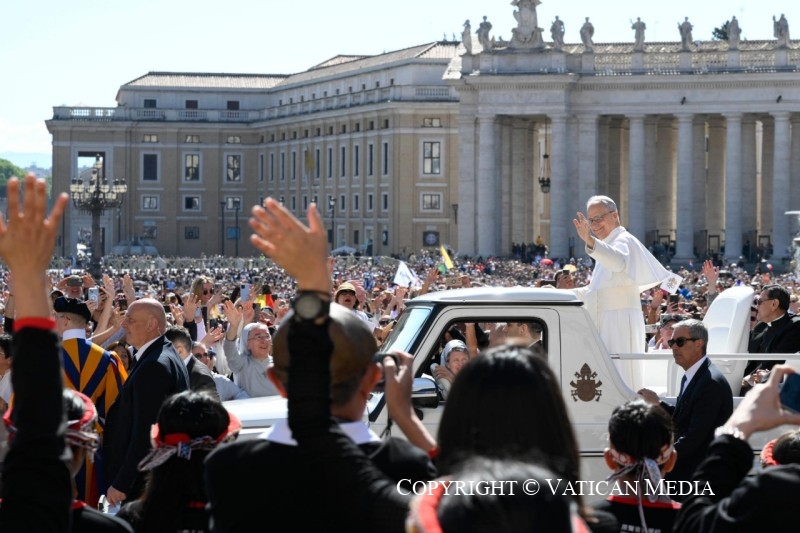Leo XIV urges ceasefire amid the “lifeless bodies of children” in Gaza
In St Peter's, in his second general audience, Pope Leo XIV spoke about Gaza. “The cry of mothers, of fathers,” he said, “rises ever more intensely to the sky.” On Ukraine, he called for action “to stop the war and to support every initiative of dialogue and peace.” In the parable of the Good Samaritan, he noted that the man was “simply a person.” With respect to others, people can either “take care of them or pretend nothing is wrong.”
Vatican City (AsiaNews) – In this morning's general audience, Pope Leo XIV once again called for peace in Ukraine and Gaza, where war has been raging for far too long.
In his address, the pontiff said that his “thoughts turn often to the Ukrainian people, affected by serious new attacks against civilians and infrastructure.” Likewise, he hears the ever more intense “cry of mothers, of fathers who clutch the lifeless bodies of children” in Gaza.
Speaking to the thousands of people who gathered this sun-filled morning in St Peter's Square, the Holy Father turned to the leaders responsible for the violence and the bombings in Gaza, urging them to accept a “cease-fire, release all hostages, [and] fully respect humanitarian law.”
In the Palestinian territory, people, including the parents of the killed children are “continually forced to move in search of a little food and safer shelter from bombing,” Leo said.
In the past few hours, hungry crowds have attacked aid distribution points on the first day of operations of the controversial Gaza Humanitarian Foundation after almost a three-month blockade.
“I assure all the victims, in particular children and families, of my closeness and my prayer,” said the pope turning his attention to the Ukraine.
Meanwhile the world waits for the next talks between Moscow and Kyiv, after those in Istanbul, and Trump's recent statements blaming Putin for the impasse.
“I strongly reiterate my appeal to stop the war and to support every initiative of dialogue and peace,” the pontiff said. “I ask everyone to join in prayer for peace in Ukraine and wherever there is suffering because of war.”
Before greeting in different languages the faithful and pilgrims from all over the world, and making appeals for peace, Pope Leo XIV read the catechesis, which is part of the cycle elaborated for the Jubilee.
Francis started it and his successor continued it last week, centred on the theme of “Jesus Christ our hope”. Today's reflection focused on the parable of the Good Samaritan (Lk 10:25-37).
Speaking about of the doctor of the Law who questions Jesus on the way “in which eternal life is ‘inherited’,” Leo explained that parables are “an opportunity to change perspective and open ourselves to hope”. And this question conceals a “need for attention” and “the only word he asks Jesus to explain is the term ‘neighbour’”.
Jesus tells the parable to turn the question “from who loves me? to who has loved,” the pope explained. “The first is an immature question, the second is the question of an adult”.
The road on which the story is set is “difficult and impervious”, and represents “life”. The man who travelled that road on his way to Jerusalem “is attacked, beaten, robbed and left half dead.”
“[L]ife is made up of encounters, and in these encounters, we emerge for what we are. We find ourselves in front of others, faced with their fragility and weakness, and we can decide what to do: to take care of them or pretend nothing is wrong.”
A priest and a Levite walked by the injured man and ignored him. “[T]he practice of worship does not automatically lead to being compassionate. Indeed, before being a religious matter, compassion is a question of humanity!”
The first two passersby “are in a hurry to return home.” Haste is “so present in our lives, that many times it prevents us from feeling compassion,” he said. The only one who is “actually able to stop” was the Samaritan, “a person belonging to a despised people”.
The pontiff noted that the Evangelist Luke does not specify where he is headed, only that he was on a journey.
“Religiosity does not enter into this. This Samaritan simply stops because he is a man faced with another man in need of help. Compassion is expressed through practical gestures.”
We call him “good,” but in reality “he is simply a person,” the Pope noted. The “Samaritan approaches, because if you want to help someone, you cannot think of keeping your distance, you have to get involved, get dirty, perhaps be contaminated”.
After taking him to an inn, “he undertakes to return and eventually pay more, because the other is not a package to deliver, but someone to care for.”
In ending the catechesis, Pope Leo XIV said: “Dear brothers and sisters, when will we too be capable of interrupting our journey and having compassion? When we understand that the wounded man in the street represents each one of us.”
17/09/2025 17:29
24/09/2025 16:23







.png)










